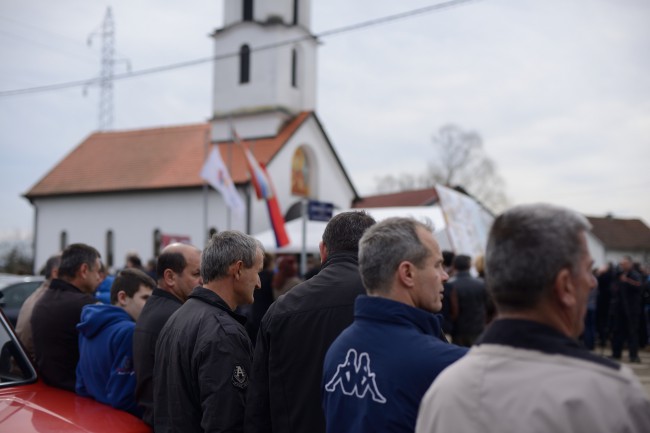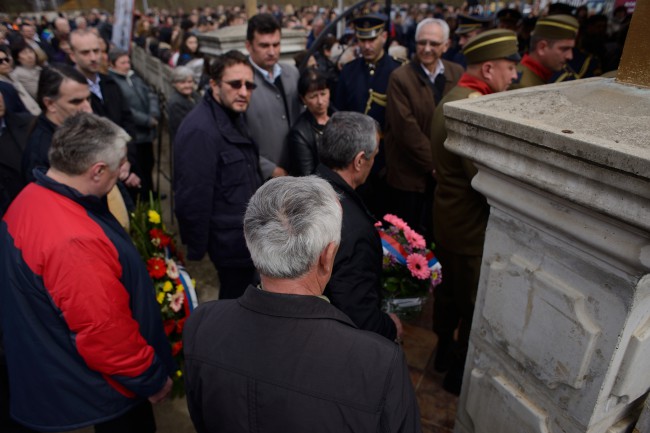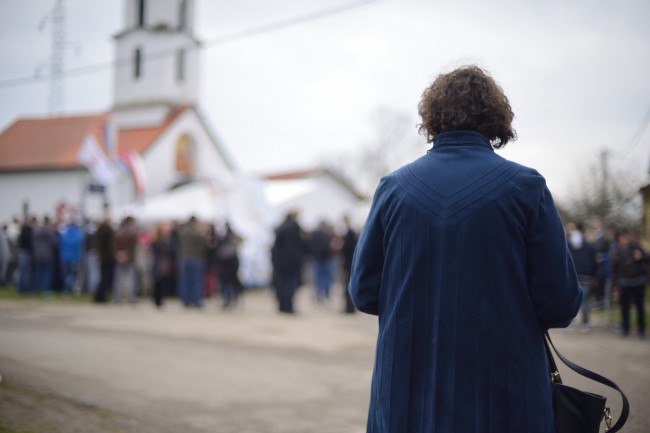Driving from Derventa towards Brod and looking at the landscape and the houses on both sides of the road, I was reminded of a news report I had read in a political weekly a few years after the war in BiH. It was called ‘Cabriolet Cities’ and was about the towns of Glamoč and Bosansko Grahovo. The title made sense only after having started reading, I found that in these two towns, after the war, not a single roof was left in place, all the houses had been burnt down. This road from Derventa to Brod is lined by such houses, too.

We had visited Sijekovac near Brod before. The first time during the visit of war-veterans from the region to Prnjavor in 2008, and then in 2010 during visits to Derventa and Brod. Members of regular forces of the Croatian Army, then called the National Guard, with the aid of a local paramilitaries, killed nine Serb civilians in Sijekovac on 26 March 1992, and another thirty seven in the following month[1]. During our visits, we found out from our hosts from veterans associations and the local population the scale of these crimes. The fate of the Zečević family in which the father and his three sons were killed on the same day is well known.
The idea to visit Sijekovac during the commemoration issued from our contact with a war-veteran from Brod who had participated in the CNA Training for War-Veterans. Having been introduced to our joint visits to commemorations, he invited us to come to Brod and organised meetings with representatives of the Disabled Veterans and Veterans Organisation. At these meetings, we presented our work with war-veterans from the region and our activities, and expressed our wish to attend the commemoration in Sijekovac. We pointed out it was important for us that the organiser know who we are and what we stand for, that we are motivated by reconciliation and that we seek to overcome past hostilities. Among us are people who want their visit to convey that they are ashamed of the crimes committed in their name. We want to be seen by those present as people much like them, for whom war brought sorrow, pain and suffering; we want to send a warning of never again. We see the joint presence of Bosniak, Croat and Serb war-veterans at commemoration sites as a way towards inter-ethnic reconciliation.

On the day of the commemoration, 26 March 2015, we met in Brod with war-veterans of the Croatian Army from Nuštar, the Croat Defence Council from Brčko and Žepče, the Army of RBiH from Zavidovići, Sarajevo and Gornji Vakuf/Uskoplje and the Army of RS from Šamac. Together with our hosts and the CNA team, there were thirteen of us in all.
As we were approaching the plateau in Sijekovac with the Church and Memorial, we saw many more people coming in a column. Police security was distributed along the road and around the church. A large billboard had been set up in front of the church with enlarged photographs and newspaper articles depicting Serb victims from the past war. There were shocking images of those killed, locations of detention camps and destroyed settlements. Serb flags were on the masts and the sound of prayer issued from the speakers. A liturgy was under way at the church. A few hundred people had already gathered in the church and the surrounding courtyard. After the organised arrival of pupils from Brod schools, the number of people exceeded one thousand. Later, a number of black vehicles with darkened windows appeared with police escort. Political representatives emerged from the vehicles with their bodyguards who cleared the way for them to the church.
The official programme started after the liturgy, in front of the church entrance. A memorial service was held and candles were lit for the killed Serb civilians. Then the host invited the delegations to lay the wreaths. The choir sung prayer songs. The quiet, barely audible song of the girls from the choir stirred up emotions with its elegiac tones. According to the protocol, the representatives of RS institutions were the first to lay wreaths, followed by associations from the RS level, and they were individually announced by the host. I noticed there was a delegation of SUBNOR[2] RS among them. Then others were invited to lay the wreaths, which included our delegation. We laid the wreath and took a moment to honour the victims. We came after the Ravna Gora Chetnik Movement[3], whose representatives had arrived in uniforms of the Serbian Army from the First World War. Thus, followers of opposing ideologies from the past, Partisans and Chetniks, found themselves in the same place, together with our group of war-veterans. Legacies from the Second World War were very pronounced in the combat units of the 1990s. They were fostered through symbols and through glorifying what most people remembered with horror and disgust. Watching it all unfold, it occurred to me that something like this is only possible here. God forbid that these ideologies should be reconciled, but when you put them in a nationalist context and environment, then you see that they need each other, that the survival of one is uncertain without the other. After the laying of the wreaths, representatives of the RS Government and the local authorities from Brod addressed the gathering. They spoke about the crime committed in Sijekovac in 1992, but also the crimes committed here by the Ustasha[4] in 1941. People had been killed back then as well, and this church had been burnt down. It was said that ‘eternal foes’ should never be forgotten or forgiven for what they have done. However, the speeches also called for tolerance and living in peace with each other. The best way to do this would be to stop being foes to each other, to have events from the past, such as these from Sijekovac, serve as a warning, and to build friendly relations in the future. The work of both the local and the ICTY prosecutors was criticised for insufficient prosecution of crimes committed against Serbs, which was characterised as inadequate, slow and politically dosed. The Court of BiH has sentenced only one person to 10 years in prison for the war crime committed in Sijekovac[5]. A crime of this scale most certainly entails multiple perpetrators. Until they are all made to face justice, there will be dissatisfaction and anger.

After the programme, we met with people from the Federation of Prison Camp Survivors of RS that we had cooperated with before. Although we met in the sorrowful context of a commemoration, they were glad to see us and thanked us for coming.
We also held a group meeting to share impressions. We were mostly disappointed by the petty politics present at these events wherever they are held. We clearly pointed out that we condemn every crime and that with our activities, we call on those responsible to prosecute the perpetrators. We agreed to continue our peace activities and not to be discouraged by efforts to keep events like this one enveloped within national-ethnic communities. We want to be seen as people and we are ready to cooperate and talk to everyone in order to contribute to the healing of our society and to the common good. The war-veterans of Brod also attended our meeting. They thanked us for coming to honour the victims and expressed their support through openness for cooperation with their associations.
On our return, as I was summing up the impressions, I thought about how invaluable it is to meet with people at these sites. Some might find it hard to understand the warmth and directness of our people. When they stand next to a stranger, they almost feel a ‘duty’ to make conversation. It usually starts with comments about how terrible the situation is, that politicians have it easy and that they have stolen enough to last their offspring. It is only later that they ask who you are and where you come from. In my case, and I later heard similar examples from others in our group, after telling them where I come from, there would be a brief pause, and then they would ask me why I had come. After I said where I was from, my collocutor would usually think of someone they knew from my town or would tell of an aunt who got married there. As for why I had come, after explaining, I never heard anyone oppose our initiative, they would always express support and say ‘keep up the good work, that’s what we need to reconcile and finally continue to live a normal life’. And I thought, why is this not something an official could say loud and clear at these gatherings, why do they keep instilling fear among us. How long will this last?
[1] Source of data:
[2] Federation of Veterans of the National Liberation Struggle (former Partisan fighters – members of antifascist units from World War 2)
[3] Chetniks – members of the ‘Yugoslav Homeland Army’ known for collaborating with the occupation of Yugoslavia in World War 2 and numerous war crimes
[4] Ustasha – units of the ‘Independent State of Croatia’, a quisling state from World War 2, known for their brutality and numerous war crimes
[5] For more, see: